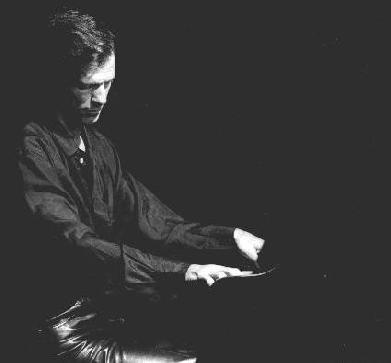Hylastic
 I've been promising a post about this for a coupla days now, so I better deliver. I've been trying to go to more free concerts, in addition to the seven on campus performances that it is imperative that I attend in the interest of my degree. The BSO College Card has been coming to the rescue lately, but NEC has actually been filling in the gaps nicely. To the point were I actually rallied some troops to attend Lee Hyla's sendoff on Tuesday. I was tipped off by Darcy James Argue, a former student of his, and its hard to argue with free. However, I didn't do my research (probably worried about hitting a deer or something, I'll explain that later) which I realized at the moment the saxophonist inhaled.
I've been promising a post about this for a coupla days now, so I better deliver. I've been trying to go to more free concerts, in addition to the seven on campus performances that it is imperative that I attend in the interest of my degree. The BSO College Card has been coming to the rescue lately, but NEC has actually been filling in the gaps nicely. To the point were I actually rallied some troops to attend Lee Hyla's sendoff on Tuesday. I was tipped off by Darcy James Argue, a former student of his, and its hard to argue with free. However, I didn't do my research (probably worried about hitting a deer or something, I'll explain that later) which I realized at the moment the saxophonist inhaled.
Stephen Drury performed the next work, "Basic Training" for solo piano, in some rather impressive pants. Pants aside, this was a work of a composer who clearly was more put together. Starting with a single middle C jammed hunt-and-peck style, that single note would unify episodes of increasing insanity. I hesitate to use the term variation, since I don't think there was really a theme to begin with, but each episode was manically distinct in character. Tone rows in one, honky-tonk in the next, only separated by a sixteenth note middle C. "Basic Training" also introduced a theme that would reappear in the majority of the works to follow. The murder and mayhem that seem inherent in much of Hyla's work is tempered by a disarmingly gentle coda.
The next piece, "Wilson's Ivory-bill" was a lengthy song for baritone, piano, and field recording. I'll admit that I have my issue with atonal song, two thousand years of song trains you to expect the voice to have the hook. Without functional harmony to push you along or remind you of where you've been, the focus becomes a lot more vertical than horizontal (as in funk compared to Mozart). However, the texture of the piece is very pointillistic and the field recordings didn't really bring anything. Furthermore, the text is really not poetic at all. The baritone floated in and out of sprechstimme to account for this, which was a neat effect but couldn't overcome the text making the piece as a whole even clunkier. But that coda I was telling you about, a major seventh stacked in fifths. He called in the Chrono Trigger chord and when it hit, it hit like Jesus hits like the atom bomb.
 One great thing is that up until this point in the concert, the performances were all by the musicians that originally premiered the works. The last piece before the break was a large ensemble work, a piano concerto in fact, so the logisitics of bringing it back home was tuff. Stephen Drury led a cast of kraazy NEC kids on a wild ride indeed. Over two movements it followed the general form of a concerto, with the slow "movement" divided between the two. Being the first real ensemble piece of the show, the lushness of the orchestration was the first thing to hit. Within the first three minutes every member of the ensemble slid from traditional playing to extended technique and back again, perfectly paced to add a new spectrum of color without sounding chinzy.
One great thing is that up until this point in the concert, the performances were all by the musicians that originally premiered the works. The last piece before the break was a large ensemble work, a piano concerto in fact, so the logisitics of bringing it back home was tuff. Stephen Drury led a cast of kraazy NEC kids on a wild ride indeed. Over two movements it followed the general form of a concerto, with the slow "movement" divided between the two. Being the first real ensemble piece of the show, the lushness of the orchestration was the first thing to hit. Within the first three minutes every member of the ensemble slid from traditional playing to extended technique and back again, perfectly paced to add a new spectrum of color without sounding chinzy.


No comments:
Post a Comment